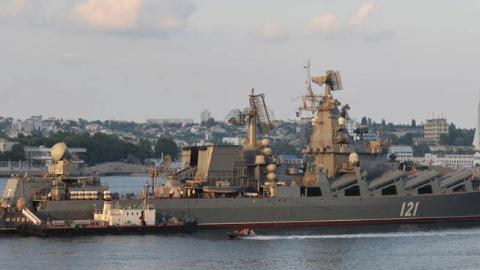President Biden’s meeting with Xi Jinping on November 15 shifted media attention from COP26 back to great-power politics, but a more subtle, yet perhaps more consequential, shift has occurred over the past month. This shift is remarkable for its lack of American involvement — it presages a Middle Eastern regional transformation over which the United States will have little to no influence. Rather, Russia and increasingly China have become the region’s key external powers. The central question for both as they move forward will be the degree of Iranian expansionism they will accept.
On October 22, Israeli prime minister Naftali Bennett met Russia’s maximum leader Vladimir Putin at the Black Sea resort city of Sochi. The meeting was critical for Bennett given his domestic political position. Prime Minister Bennett’s minority right-wing Yamina/New Right party holds only seven seats, compared to his coalition ally Yair Lapid’s 17. Moreover, the rest of the coalition is composed of numerous splinter, generally secular parties from left and right. Bennett will retain some control in 2023, when the premiership is scheduled to rotate to Lapid. But his numerical disadvantage bodes ill for his and his party’s long-term political prospects.
In the next election, one would expect Bennett to tilt back toward the Right, playing a key role in a center-Right coalition government to box out the secular Left, with which Yesh Atid aligns. Yet Bennett’s erstwhile ally and mentor, recently ousted prime minister Benjamin Netanyahu, retains significant political power despite his ongoing corruption trial. Not only has Netanyahu emerged as Bennett’s fiercest critic — his policy criticisms have some substance. Bennett is a shrewd politician, having served in ministerial positions since 2013, and as defense minister from 2019 to 2020. But Netanyahu’s foreign-policy experience was a critical selling point for Likud voters, and a line of attack he has exploited since leaving office. Netanyahu claimed that his personal relationship with Putin gave Israel greater flexibility in Syria, allowing the IDF to conduct a long-term interdiction campaign against Iranian targets without sparking Russian resistance.
Bennett’s meeting with Putin has challenged this narrative. As an Orthodox Jew, the Israeli prime minister could not travel on the Sabbath. He departed for Sochi at 5:00 a.m. Israel time, but the meeting went on for so long — it was reportedly productive — that he could not return to Israel for the Sabbath. Specifics are difficult to identify, apart from Israel’s certification of the Russian Sputnik COVID-19 vaccine for travelers. However, Israeli and other sources have reported that Bennett and Putin extended the “deconfliction” agreement that allows IDF fighters to strike Iranian forces in Syria absent Russian displeasure, and without Russian air-defense resistance, which seemed a possibility this past summer. This is a political coup for Bennett and comes just as Netanyahu’s corruption trial intensifies.
One week later, Saudi Arabia expelled Lebanon’s ambassador, and recalled its own representation in Beirut. The UAE, Bahrain, and Kuwait recalled their ambassadors shortly after. Saudi actions followed criticism, by Lebanese information minister George Kordhai, of the kingdom’s war in Yemen against the Iranian-backed Houthis. Kordhai is a member of Marada, affiliated with the March 8 Alliance, a Hezbollah-dominated Lebanese political coalition. Hezbollah is a key member of the current governing coalition, despite the September kerfuffle over the organization’s apparently illegal import of Iranian oil. Ousting Kordhai could trigger Hezbollah backlash, in turn prompting up to 25 defections from Najib Mikati’s recently formed governing coalition. Given Lebanon’s continued economic and energy crisis, a political reshuffle coupled with obvious governing incompetence could spark renewed protests. Lebanon would be forced closer to Iran, and possibly Turkey.
Approximately two and a half weeks later, Syria’s Bashar al-Assad met with UAE foreign minister Abdullah bin Zayed in Damascus. No Emirati official has visited Syria since the civil war began in 2011. This follows the UAE’s reopening of its Syrian embassy in 2018, the Emirati–Syrian meeting at the 2020 Dubai Expo, and increasing Emirati support for Syria’s readmission into the Arab League. In turn, Syrian and Saudi intelligence chiefs met at the Arab Intelligence Forum in Cairo on November 9. Saudi Arabia’s public reluctance to engage with Syria directly follows Riyadh’s standard procedures. The kingdom has less political flexibility than its smaller ally, owing to its institutional religiosity. Hence, in the 2017 Qatar crisis, the UAE took the lead by conducting cyber operations, and it was the main diplomatic interlocutor during the Abraham Accords negotiations with Israel.
The Tehran question is central for each regional actor. Iran has continued its expansionism in Syria and Iraq despite losing Qasem Soleimani in January 2020. Throughout the past year, Iran and Israel have conducted increasingly public cyber campaigns. While Iran’s more aggressive attacks against Israel’s water supply have failed, Israel has sabotaged Iran’s major port, attacked Iranian nuclear facilities, and, most recently, likely disabled gas stations across the country. Tehran’s objective today remains regional hegemony. Driven by a unique combination of Shia messianism, adapted socialist rhetoric, and imperial nostalgia, the Iranian regime both fears the West and views itself as the rightful leader of the Islamic world.
Each of these actions is aimed at curbing Iranian influence. Israel has ensured its freedom of action in Syria, allowing it to degrade Hezbollah’s and Iran’s operational capacity. In turn, Saudi Arabia and the UAE are working to dislodge Syria from Iran’s orbit, possibly in concert with Russia. In both cases, Moscow, not Washington, is central.
Israel, the UAE, and Saudi Arabia all stand to lose from Iranian expansion, with Turkey’s situation the more complex one. Hence the strategic logic behind the Abraham Accords, the Trump administration’s legal groundwork for a more explicit Israeli–Arab anti-Iranian alliance, which the Biden administration refuses to acknowledge by name.
Indeed, Biden and his team appear to view Israel–Arab entente as a spoiler to the possibility of reviving the Obama-era vision of an American–Iranian rapprochement. Renewed nuclear negotiations have made little progress, likely because of Iran’s increased ties with Russia and China — Tehran has been accepted as a full member of the Shanghai Cooperation Organization and is aggressively seeking Chinese investment through the Belt and Road Initiative. Russia’s political position in the Middle East is much stronger than in 2014, given Assad’s victory in Syria. China, meanwhile, has expanded its economic influence, cultivating links with Israel, Saudi Arabia, and the UAE alongside Iran. Moscow and Beijing reasonably see little need to acquiesce to American demands on Iran, particularly as the Biden administration reduces its predecessor’s pressure on the Islamic Republic.
Nevertheless, both great-power challengers must answer the Tehran question, given the Middle East’s relevance to their interests. Russia’s response is clearer, China’s less so. In both cases, however, they will support a regional arrangement damaging to American interests.
Russia has accomplished its Middle Eastern strategic objective. It has a secure foothold in the eastern Mediterranean, from which it can support renewed operations in Libya, boxing out Turkey, and pressure NATO’s soft underbelly during a Baltic crisis. A renewed regional conflagration would jeopardize Russia’s ability to stir up trouble in Libya and siphon off resources and attention from far more critical Mediterranean and European operations. This explains Russia’s acceptance of Israeli airstrikes against Iranian targets in Syria and its increased diplomatic overtures to the Gulf Arabs, most recently demonstrated through the August 2021 Saudi–Russian defense cooperation agreement. Yet Russia is hesitant to abandon Tehran completely — a new Russian–Iranian defense agreement may be in the making, which would provide Iran with improved conventional air defenses critical to deter an Israeli strike on its nuclear program.
China, by contrast, is more ambivalent. It requires petrochemical support from every actor in the region with oil reserves — this motivates its increased economic and diplomatic support for Saudi Arabia, the UAE, and Iraq, its desire to participate in Syrian reconstruction, and its extreme interest in Israeli high-technology firms. Middle Eastern currency also can lessen the shock of a Western withdrawal from Chinese markets. More critically, by cultivating ties with the United States’ regional allies, China can disrupt a likely American blockade of the Malacca and Lombok Straits, the so-called “far blockade” in a U.S.–China conflict, reducing the possibility of long-term wartime pressure against Beijing. Nevertheless, Iran is a potential cobelligerent: Despite its less sophisticated capabilities, its action in the Middle East would compel the U.S. to divert forces from the Indo-Pacific, shifting the balance of forces in China’s favor.
China and Russia will determine their new Middle East policy in the next 18 months. The CCP’s 20th National Congress, scheduled for October and November 2022, is poised to prove decisive for Xi Jinping. It is the culmination of his decade-long campaign to gain complete control of the party, erasing the Shanghai clique of former paramount leader Jiang Zemin. Xi’s most recent preparatory step has been the recently passed “History Resolution,” which enshrines his historical role in the CCP. We can expect a marked increase in Chinese assertiveness after the 2022 National Congress, particularly against Taiwan, the conquest of which Xi deems central to his legacy. Putin, meanwhile, will face another election in 2024. The power of the former KGB officer, though an autocrat, rests on his electoral supermajority. A Russia–NATO conflict between late 2022 and early 2024 would bolster his domestic support, demonstrating his central role in ensuring Russian power and prestige.
Russia and China may simply abandon Iran, judging that the Gulf Arabs and Israel are more reliable partners who would cause them far less trouble. They may instead opt for a fluid political balance, although Iranian escalation in tandem with a cross-strait conflict could put Russia in a tense position vis-à-vis China if Russian links with the Israeli–Arab entente continue to improve. Nevertheless, even now, the Israeli prime minister looks to Russia’s head of state, not the American president. Absent great-power patrons do not remain patrons for long. The policy establishment’s oft-discussed Middle Eastern power vacuum does not exist. America’s adversaries have already filled it.
Read in National Review


















